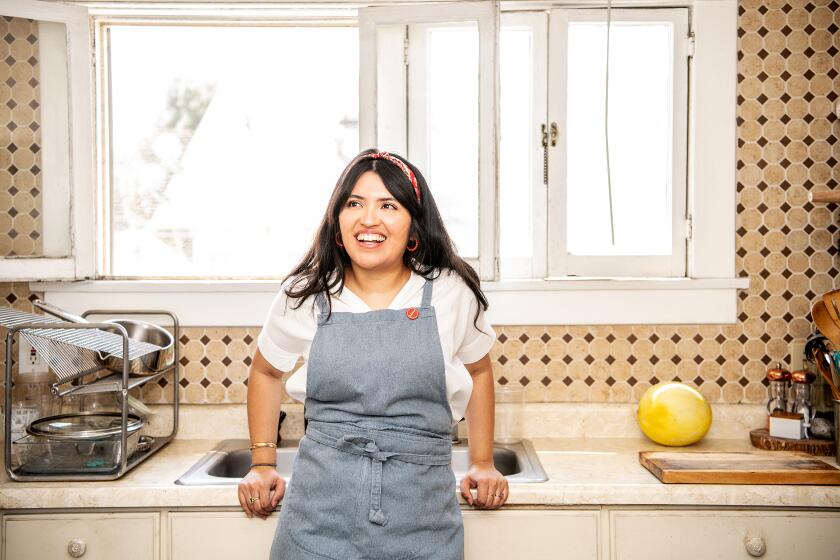Dream food
- Share via
A”life list” is a list of things to do before you die. A food life list: food experiences you’ve always wanted, before it’s too late.
With the arrival of the holidays, what food experience of a lifetime would be on your personal gift list? My list goes beyond the material. I also ask: What is worth savoring and saving?
I have a written list because then the entries feel more like goals instead of fantasy. They’re detailed because they are real, not passing notions of wild imagination.
Perhaps because I farm organically, foods have often carried a special significance for me. They create memory, are personal yet very public and embody a good story. I hope people long for food experiences, curious about the entire journey of food: beginning with meeting those who grow it, visiting the region where great foods come from, participating in the creation of a meal and ending with the communal act of eating with family and friends. A food life list is filled with such possibilities -- experiences of shared meaning.
On my list are three things: eating sushi with real wasabi, experiencing truffles in France or Italy and discovering the perfect peach.
Real wasabi is not the spicy green paste most people eat with sushi. That’s made from a horseradish with a clean-out-your-sinuses taste.
A delicate plant, real wasabi requires a climate constantly flushed with water, cool but not too cool, shade but not too much shade. Fields near mountain streams in Japan and New Zealand work the best, and a nascent wasabi horticulture in the Pacific Northwest is emerging for this finicky plant.
When served with sushi, the root is grated and the spicy “heat” has a mellow, rounded flavor, lasting only for a few hours when exposed to air. It’s best served extremely fresh -- maybe just pulled from the ground and shaved onto the plate. Wasabi’s keen sense of timing makes me want to try some even more.
The problematic and temperamental wasabi plant challenges me as a farmer. Growing something this good is supposed to be hard. It rewards the skills of the diligent farmer who adopts an artisan’s approach. Real wasabi enhances flavors, it doesn’t overwhelm them. Because it’s so rare and hard to grow, the mystique makes it even more worthwhile.
My dreams of truffles (not the chocolate ones) take me to another land, far away from the hot, dry climate of my farm in Central California. The truffles I seek reside in Alba, in the Piedmont region of Italy, or in the south of France in Provence, though I have heard stories about the fragrance of Oregon truffles too.
Truffles, a subterranean fungi,grow in specific conditions, often around the roots of oak trees. A delicacy, eaten in season (usually in the fall), their flavor comes from their aroma. Earthy and sensual. Musky. People claim the pungent fragrance works as an aphrodisiac (yet to be scientifically proved, but when is love about science?).
I’m not sure I’ve eaten authentic or fresh truffles. I’m sure I would have recalled their memorable aroma. Best served soon after discovery, truffles are often hunted in wooded areas by trained pigs or dogs; their acute sense of smell leads them to these fungi just as spores are released at the peak of their odor.
My dream is to go hunting for them and enjoy the fruits of my labor at lunch or dinner. Flavor married to a place -- truffles, like many great foods, belong to a specific appellation. I want to be part of that environment, sharing the weather, the landscape, the soil, all part of the terrior. Knowing where my food comes from is part of my life list.
My quest to grow the perfect peach has been ongoing for 30 years. I feel I have come close when sampling my best fruits, as the nectar explodes in my mouth and the juice trickles down my cheeks. Then I pause, believing I can do better. My quest for the perfect peach sentences me to a lifetime of failures. I like to think of it as a series of opportunities and lessons. The journey still counts.
But I fear many farmers have forgotten to dream. We don’t believe our products belong on someone else’s food life lists. We undervalue our work, forgetting the passion we put into working the land.
Agribusiness has morphed into a plate-centric culture, consuming as much as you can, the cheaper the better. The things I seek on my life list may be gone in the wake of an industrialized food system. Mass production and economies of scale make farms look like factories; perfection is lost in the abundance. I want to believe that, in the end, quality still matters.
Is my food life list elitist and expensive? Perhaps. But this is about dreams, and I hope people dream enough so small farms can stay in business.
Food life lists manifest things worth savoring. We’re then faced with a public policy question: What do we need to champion? What are the foods and farmers worth saving?
David Mas Masumoto is an organic peach farmer near Fresno and a fellow of the Kellogg Foundation.
More to Read
Eat your way across L.A.
Get our weekly Tasting Notes newsletter for reviews, news and more.
You may occasionally receive promotional content from the Los Angeles Times.










